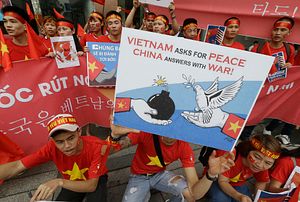Last week, a high-ranking Vietnamese official made headlines with a suggestion that Vietnam may consider alternative measures in managing the South China Sea disputes it is embroiled in, including international arbitration which the Philippines had previously pursued against China. Though the remarks were carefully calibrated and do not in and of themselves constitute a policy change, they are nonetheless important to consider given the evolving dynamics in the South China Sea as well as Vietnam’s important role in the disputes.
The idea of a legal aspect to Vietnam’s South China Sea approach is not entirely new. Vietnam, like the other three smaller Southeast Asian claimants relative to China – Brunei, Malaysia, and the Philippines – has repeatedly made reference to international law, even as it advances other aspects of its South China Sea approach including advancing diplomacy through the Association of Southeast Asian Nations (ASEAN), engaging with major powers including China, and building up its own military capabilities. And while Vietnam has not formally mimicked the Philippines thus far in filing a case against China thus far despite heightened Sino-Vietnamese tensions that have continued into 2019, Vietnam has utilized the legal course in other ways, with a case in point being a joint submission that it had advanced with Malaysia to the Commission on the Limits of the Continental Shelf (CLCS) in May 2009.
Last week, new indications surfaced about Vietnam’s consideration of a legal options in the management of South China Sea disputes. In a keynote address delivered at the opening session of the annual South China Sea International Conference held in Vietnam, Vietnam’s deputy foreign minister Le Hoai Trung made reference to Vietnam potentially pursuing international legal arbitration to manage the South China Sea disputes. “We know that these measures include fact-finding, mediation, conciliation, negotiation, arbitration and litigation measures,” Trung said, before going on to note that “the UN Charter and UNCLOS 1982 have sufficient mechanisms for us to apply those measures.” While such courses may have been discussed privately by Vietnamese officials and scholars before, Trung’s official, public remarks constituted a notable development in this vein.
To be sure, upon closer examination, Trung’s comments themselves were not as pointed as was suggested in some subsequent media reports: if one reads his full address, the much-quoted comments were presented as part of a broader set of remarks on opportunities and challenges for peace and cooperation in the South China Sea, and while there was reference to measures such as international legal arbitration and obstacles to existing approaches, this was calibrated by reference to existing policy where Vietnam “has given priority to and gained significant achievements through bilateral negotiations with relevant countries.” Nonetheless, the fact that even subtle suggestions were made publicly by a high-ranking official at a prominent conference as Vietnam faces increasing coercion from China and just before Vietnam assumes the 2020 ASEAN chairmanship is nonetheless worth paying attention to as it suggests where Hanoi’s South China Sea approach could be headed should current trends continue.
Beyond the focus on Trung’s remarks, the key question is what the implications would be if Vietnam were to follow through with this move. Here, the implications are less clear. On the one hand, much like the Philippines when it filed a case against China in 2013, there is no doubt that Hanoi would be within its right to pursue such a course given the pressure it has been under of late, or that would reinforce Vietnam’s commitment to pursuing legal means to resolve differences which are preferable to the forms of coercion that continue to be exercised by Beijing. Irrespective of the verdict, Vietnam’s approach would stand in marked contrast to that of China and would attract significant international attention, which partly explains why Beijing was quick to react following Trung’s comments.
But on the other hand, as I pointed out with respect to the Philippines’ South China Sea legal challenge as well, ultimately, while cases such as the one Vietnam may pursue may of course be important in their own right, the full extent of their significance will depend on both the willingness of countries to abide by the verdict as well as actions taken by actors to enforce the outcomes. In the case of the Philippines vs. China example, the fact that we saw China refuse to abide by it and the failure of other actors – including the United States and most dramatically, the Philippines itself with the entry of President Rodrigo Duterte into office – to enforce it ultimately undermined the significance of the verdict and exposed the limits of legal approaches, irrespective of how far some of these critiques may have been.
Of course, the comparison with the Philippines case ought not to be stretched too far given the significant differences between the two examples, on counts raging from capabilities to regime type. And Vietnamese officials are no doubt aware of the opportunities and challenges presented by a focus on this legal course, and, as previously, they can be expected to weigh them carefully along with other options that it has as part of a multifaceted and carefully calibrated South China Sea approach. Nonetheless, any indications that Vietnam is moving ahead with a legal challenge on the South China Sea deserves careful watching in the months and years ahead given the significance it may hold not only for Hanoi’s approach, but for the South China Sea disputes and the region more generally.
































